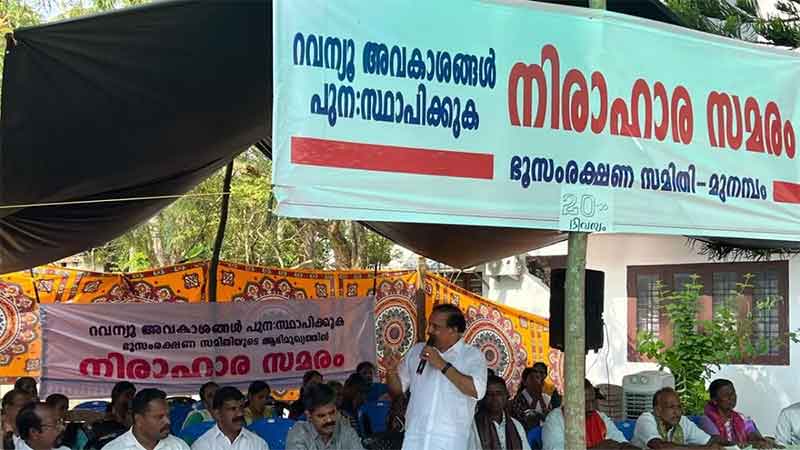
The land issue at Munambam has now become a major controversy, discussed not only in Kerala but across the country. However, this is not merely a matter concerning the local laborers or the middle class. At the core lies the Waqf Amendment Bill proposed by the Modi government. The Sangh Parivar and its propaganda machinery have played a central role in making it the focal point of this controversy. They point to the Munambam issue as proof of the necessity for the new amendment. A faction within the Catholic Church, which aligns with the Sangh ideology, has also taken this up. This article aims to analyze the truths and lies surrounding the matter.
The Munambam Land Issue
The issue primarily affects the fishing communities that have lived in the area for generations. Whether the land belongs to the Waqf or not, evicting them from their homes is unjust. The authorities have a responsibility to secure their rights to the land. This could have been done within the framework of existing laws. The land, when transferred to Farook College, ignored the generational residents who lived there. This transfer, whether it was made as a Waqf property or a private donation, denied the landless people their rightful claim.
From any perspective—be it basic justice, the principles of humanity upheld by religions, or any moral angle—the injustice in this matter is apparent. Evicting those who have lived there for decades without recognizing their rights is an ethical wound that Farook College deepened by selling the land. The Waqf Board, which insists on reclaiming the land, contradicts its own moral and spiritual principles.
The Role of Political and Religious Forces
The Sangh Parivar and a faction within the Catholic Church have been instrumental in communalizing the Munambam issue. However, the role of the CPM leadership and the Pinarayi government also cannot be ignored. They had opportunities to intervene early on but failed to act.
As the Waqf amendment issue gained traction, Brahmanical Hindutva fascists began using the Munambam issue to advance their agenda. Instead of countering this immediately or exposing the lies about the Waqf amendment, the CPM leadership remained silent. Only after other non-mainstream groups raised their voices did the CPM and Pinarayi government step in to protect their image. This approach is dictated by their narrow electoral politics.
Debunking the Lies
Lie 1: The Waqf amendment proposed by the Modi government will solve the Munambam land issue.
Truth: The only provision in the Waqf Act of 1995 relevant here is Section 83, which assigns disputes related to Waqf property to a tribunal. The amendment merely adds a provision to appeal tribunal decisions to the High Court within 90 days. Existing laws already allow the High Court to review tribunal decisions. This amendment, instead of expanding rights, actually limits them. The time bar it has introduced reduces the opportunity to challenge a Wakf claim. Earlier there was no time bar on the appeal.
Lie 2: The Waqf Board owns more land than even the railways and the military.
Truth: The Waqf Board only oversees Waqf properties; it does not directly own them. Moreover, the cumulative land under Hindu temples and monasteries in India far exceeds the total Waqf land.
Lie 3: Section 40 of the Waqf Act allows the Board to claim any property.
Truth: Section 40 only authorizes the Board to investigate and determine whether a property qualifies as Waqf. Such decisions are subject to scrutiny by the tribunal and the High Court.
Lie 4: Section 3 of the Waqf Act allows the Board to acquire any property it deems Muslim-owned.
Truth: Section 3 merely provides definitions for terms used in the Act, such as what constitutes Waqf.
Lie 5: Section 8 of the Act ensures that only the Waqf system resolves disputes about its properties.
Truth: Disputes can be reviewed by the High Court, as stated explicitly in the Act.
Lie 6: Section 40 of the Act places the burden of proof on the claimant to establish that a property is not Waqf.
Truth: No such provision exists in the Act.
Lie 7: Waqf systems are unique to India and absent in Islamic countries.
Truth: Waqf systems exist in many Islamic countries, though their administration may differ.
Lie 8: Including non-Muslims in Waqf Boards is necessary because the Board might claim non-Muslim properties.
Truth: The law already involves government oversight through District Collectors, negating such fears.
A Final Warning
The Sangh Parivar’s attempt to communalize the Waqf amendment is a step in its broader agenda against minority rights. By joining hands with these forces, sections of the Catholic Church overlook the dangers of Hindutva fascism turning against them tomorrow.
Subscribe to Our Newsletter
Get the latest CounterCurrents updates delivered straight to your inbox.
Father Martin Niemöller once said about Nazi Germany:
“First they came for the Communists, and I did not speak out because I was not a Communist. Then they came for the trade unionists, and I did not speak out because I was not a trade unionist. Then they came for the Jews, and I did not speak out because I was not a Jew. Then they came for me—and there was no one left to speak for me.”
It’s time to heed history’s warnings.
Janakeeya Manushyaavakasha Prasthanam is a human rights organisation based in Kerala









































